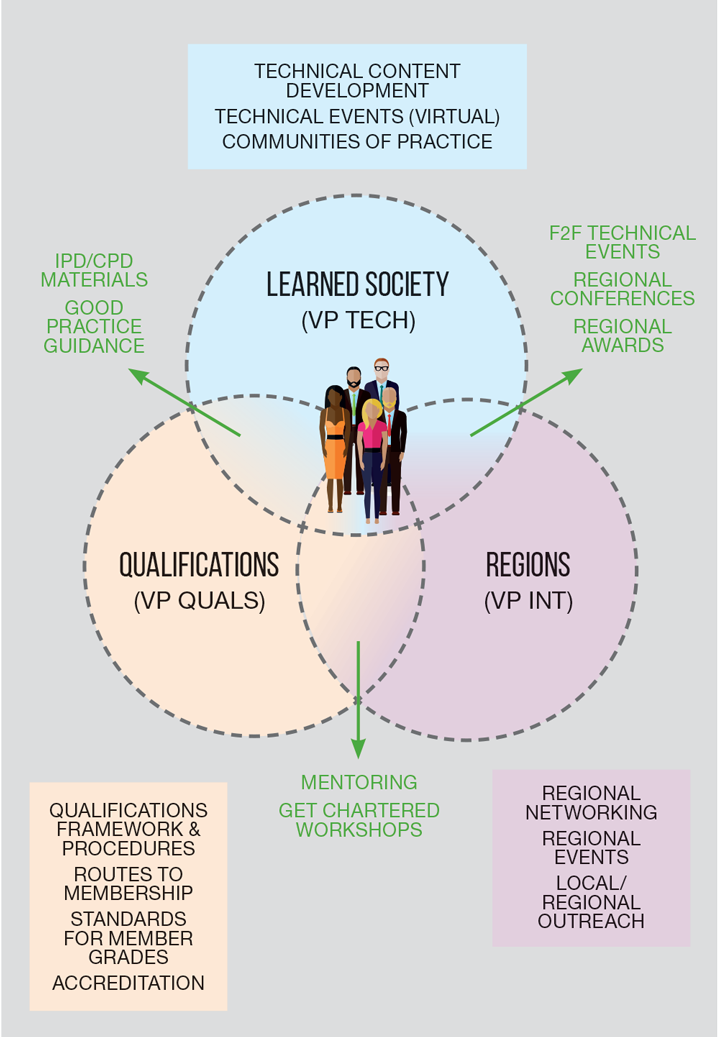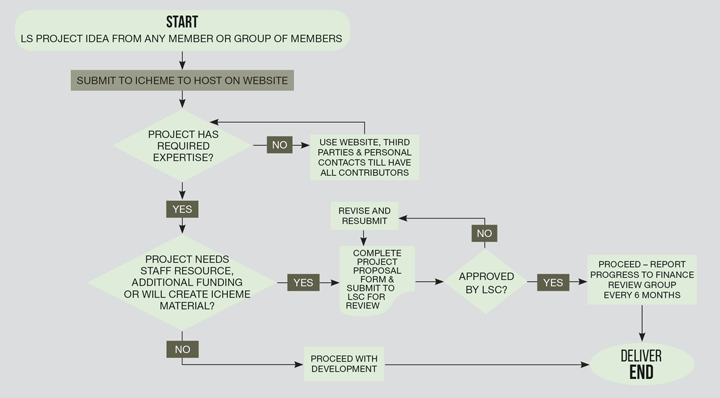IChemE as a Learned Society
Jarka Glassey and Claudia Flavell-While explain plans to achieve the Institution’s learned society ambitions
ICHEME aims to be a vibrant learned society that materially impacts on the grand challenges globally, and an informed and influential commentator and collaborator – that is clear from IChemE’s strategy. It’s a tall order. How to best deliver this has been the subject of extensive consultation and planning over the past year, the outcome of which we’d like to share with you here.
The first tangible recommendation of the consultation has already been put into action: as of this year, members can join as many special interest groups (SIGs) as they wish at no extra cost. There is no longer a tax on learning.
The rest of the proposals, developed by a group of members under the leadership of the Vice President (Technical), were shared with members via a webinar earlier this year and approved by the trustees in April.
We now move to implementing the plans. To succeed, we need a significant number of members with technical knowledge and authority who are willing to engage and provide their expert input.
In turn, IChemE is significantly strengthening the staff team that supports this work. We are also overhauling the way that SIGs are funded, to properly fund activities, encourage collaboration between groups, and enable them to develop new ideas and activities.
To succeed, we need a significant number of members with technical knowledge and authority who are willing to engage and provide their expert input
By the end of the year, we will put in place alternative routes for members to come to us with ideas for projects and outputs, and we will put in place a funding mechanism, and staff support to help get these off the ground.
We are actively engaging and collaborating with other learned societies and relevant partner bodies, and we are gathering a broad portfolio of technical materials and making it available to all members. These materials will be a mixture of resources that are already available but not always easy to find, material that was previously not accessible or only available to a minority of members, and new material generated by the methods above.
Governance
In keeping with being a member-led organisation, learned society activity will be the responsibility of a newly-created Learned Society Committee. The committee will consist of Chartered Members of IChemE, democratically elected by the Learned Society Forum – another new body that brings together the SIGs, technical representatives from regional members groups, and representatives from other learned society bodies such as our publications, existing centres, or future communities of practice.
Any Chartered Member can stand for the Learned Society Committee. We will invite nominations later this year against a grid of sectoral and functional specialisms to ensure a broad spread of expertise.
The Learned Society Forum acknowledges the vital role regional groups play in delivering learned society content to the members in face-to-face meetings. It will provide a valuable mechanism for furthering this engagement and fostering collaboration.
Duties
The Learned Society Committee will steer IChemE’s activities as a learned society. It will work in close collaboration with the Learned Society Forum to actively promote the technical development of chemical engineering. It will also take ownership of our technical roadmap, Chemical Engineering Matters, and use it to set strategic priorities for IChemE as a learned society. In addition to that, it will look after other projects proposed for the learned society, review proposals for new SIGs and other learned society groupings, and oversee the full spread of IChemE’s learned society activities – webinars, books, journals, policy work, technical centres, and the delivery of new documentation and outputs of the learned society, such as technical standards, quality assurance and CPD materials.
Delivery
In the consultation, members told us that they want their learned society to help them network with peers on a technical level, to publish useful, practical information, and to enable them to learn and improve their skills. Helping members maximise their professional potential and translate chemical engineering
knowledge into evidence-based policy will enable us to become the vibrant learned society IChemE’s strategy sets out.
The Knowledge Hub
We want to make existing and future technical content easily discoverable and available to all members. At present, content is spread across the SIGs’ individual web areas, or in special sub-sites (Loss Prevention Bulletin, The Chemical Engineer, policy papers). IChemE’s journals archives are held externally, while other content has not been available at all, such as many years’ worth of conference proceedings and other technical briefings. We want to make as much of the existing content as possible – and any new content the community develops – available to all members from a single central webpage, which we will develop during the rest of the year.

Supporting activity
We want to enable our members to develop more technical content of all types, including categories that are currently poorly served by IChemE, such as good practice guides and base level training. We know that this takes a lot of volunteer time and effort, and we are adding more technical support staff to support the volunteers.
We also need to make the best use of existing activity, for example by recording and webcasting physical events whenever possible and by routinely sharing information about technical activities across SIG and members group boundaries with all members for whom they are relevant.
Additional funding is in place to reward SIGs for being more active, but we will also give extra support to SIGs that are struggling, to help them revitalise.
Learned society projects
We will support the delivery of additional activity and resources for the learned society through a project proposal mechanism. Any member will be able to bring forward an idea for a learned society project. These projects could deliver anything – a good practice guide, a technical event, a register of information, a piece of software, a technical study etc. The proposer will need to set out deliverables, timescales, milestones, resources required and any external funding secured. We will share project proposals with members through the IChemE website, so that other members can volunteer to join the project.
Once there are enough volunteers to deliver the project, the proposal can proceed to the Learned Society Committee, which will review the ideas and decide which should go ahead, based on the fit with strategy, resulting benefit and availability of resources. Only projects that require money or staff time, or which need an element of peer review, need to be approved by Learned Society Committee, others (supported by SIG or other budgets) proceed immediately (see Figure 2). This mechanism will provide a new route for member volunteers to engage in IChemE activity and will generate useful material and activities for the learned society. It will also enable SIGs to deliver activities that would ordinarily sit outside their scope of work or ability to fund.

Funding
We recognise that to enable volunteer members to put together webinars, events, good practice guides etc, they need an appropriate amount of funding. A separate working group, composed of treasurers of a range of current SIGs, was set up late last year and the trustees have already approved their recommendations. From 2020 onwards, all SIGs will receive a combination of fixed base funding and additional funding linked with the SIG’s level of activity. Changes to accounting practices will enable SIGs to move to a three-year rolling budget where they can carry forward surpluses (and deficits) they may have made over the course of the year into the next year, up to a limit of +/- 20% of the budget. Staff are now looking at how we can apply the same principles to regional members groups.
Next steps
Over the summer, we will be looking for nominations for the Learned Society Committee, which will be so central to all activity in this area. Behind the scenes, we will be developing the Knowledge Hub, scanning and cataloguing content, and putting in place the necessary IT infrastructure to upload and view project proposals. We very much look forward to working with you all.
If you have any comments or suggestions, email chemengmatters@icheme.org. A recorded webinar which set out the above proposal and answered questions from members is available at www.icheme.org/learned-society-webinar.
Recent Editions
Catch up on the latest news, views and jobs from The Chemical Engineer. Below are the four latest issues. View a wider selection of the archive from within the Magazine section of this site.




